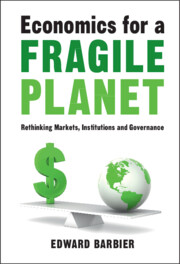Book contents
- Economics for a Fragile Planet
- Economics for a Fragile Planet
- Copyright page
- Dedication
- Contents
- Figures
- Tables
- Preface
- Acknowledgments
- 1 Introduction
- 2 Humankind and the Planet
- 3 Economics for a Fragile Planet
- 4 Climate Change
- 5 Land Use Change and Biodiversity
- 6 Freshwater
- 7 Oceans and Coasts
- 8 Public Policies
- 9 Business
- 10 Conclusion
- References
- Index
7 - Oceans and Coasts
Published online by Cambridge University Press: 24 March 2022
- Economics for a Fragile Planet
- Economics for a Fragile Planet
- Copyright page
- Dedication
- Contents
- Figures
- Tables
- Preface
- Acknowledgments
- 1 Introduction
- 2 Humankind and the Planet
- 3 Economics for a Fragile Planet
- 4 Climate Change
- 5 Land Use Change and Biodiversity
- 6 Freshwater
- 7 Oceans and Coasts
- 8 Public Policies
- 9 Business
- 10 Conclusion
- References
- Index
Summary
Chapter 7 argues that, if we are to halt humankind’s unrelenting exploitation of marine sources and sinks, we need to change our economic approach to oceans and coasts. It begins with addressing the underpricing of marine capital and their services and the underfunding of ocean and coastal conservation. Addressing these challenges must also be the focus of global collective action. The savings and revenues generated can also be allocated to support global funds and investments in marine capital and protection. However, more comprehensive cooperation between the international community, national governments and the private sector is required to develop global policies to protect vulnerable coastal populations, disappearing marine habitats, such as coral reefs and mangroves, and the deep sea.
Keywords
- Type
- Chapter
- Information
- Economics for a Fragile PlanetRethinking Markets, Institutions and Governance, pp. 183 - 216Publisher: Cambridge University PressPrint publication year: 2022

